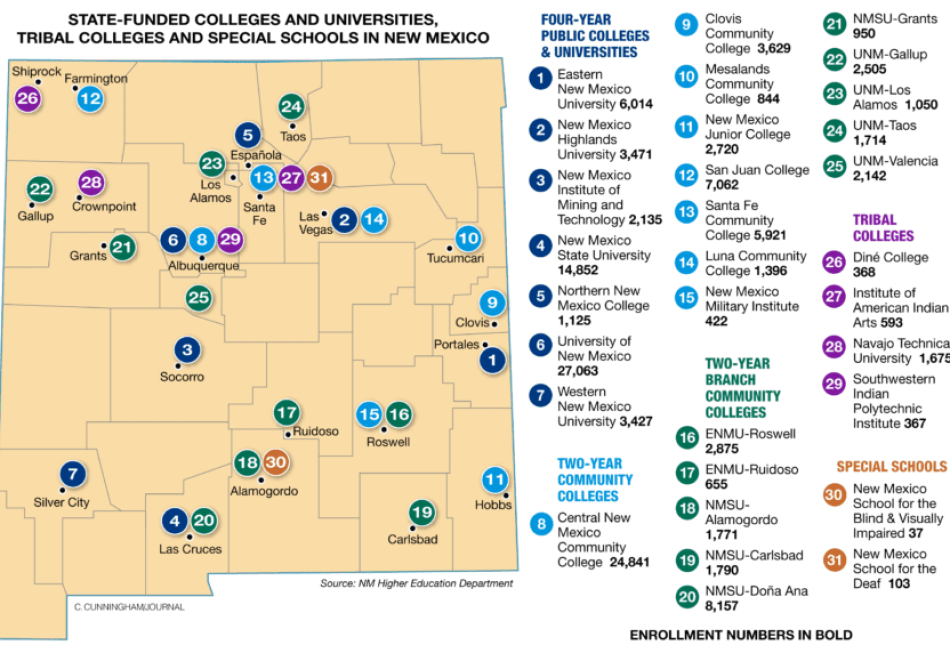UNM, higher education in desperate need of reform


Our state’s system of taxpayer-funded higher education is in crisis. A few key facts about postsecondary institutions in the Land of Enchantment, and the University of New Mexico in particular, reveal the depth of the problem:
• New Mexico spends quite a lot on its government colleges and universities. According to the state Higher Education Executive Officers, the “national association of the chief executives of statewide governing, policy, and coordinating boards of postsecondary education,” we spend $9,348 per full-time equivalent enrollment. That sum is far in excess of the national figure of $7,642, despite the state’s low cost of living. On occasion, brave voices have acknowledged the system’s spendthrift ways. In 2016, former UNM President Chaouki Abdallah told the Albuquerque Journal: “Our higher ed spending is more than most other states; the trouble is we don’t spend it wisely and (we) spread it across so many entities.”
• Enrollment at several of the major institutions is dropping. It’s fallinal reported that UNM enrollment dipped “2.9 percent from the fall of 2016 to the fall of 2017 and has dropped a cumulative 9.3 percent since its 2012 peak.”
• New Mexico has a plethora of branch campuses – including five for UNM alone. A 2017 investigation by the Legislative Finance Committee found that, in all, “New Mexicans have approximately 77 physical points of access to higher education throughout the state.”
• UNM, using data from the College and University Professional Association for Human Resources, has documented the need to raise salaries in order to keep compensation competitive. The university’s president has lamented the phenomenon of junior faculty being “often picked off before we can even get them into the tenure process.”
• UNM’s sports programs operate at a deficit, and plans to cut women’s beach volleyball, men’s soccer, and men’s and women’s skiing have generated outrage and opposition from both candidates for governor.
The fact that both candidates for governor expressed opposition to the decision to cut sports at UNM is not surprising. That is the populist opinion. Talking about limits and priorities is never fun, but it’s even tougher with a $1.2 billion state surplus.
Regardless, the issue of athletics is merely a microcosm of UNM’s broader problems: As much as it may try, it simply can’t be everything to everybody. At the very least, branch campuses should be on the cutting block, but not one politician seems interested in taking on that tough reform, because having a branch campus is what passes for “economic development” in too many struggling rural communities across our state.
Cutting back on UNM “sprawl” would free up money to offer faculty more competitive pay. It would also enhance the university’s standing as an institution that attracts top-notch faculty. Again, former UNM president Abdallah had his finger on the pulse of the problem when he noted that while his institution had “spires of excellence, best in the world or top five,” like everything else around this state, the average is bad because you have to make sure everyone is taken care of.
Abdallah’s assessment applies to sports, as well. A bold move to eliminate the costly – both financially and in terms of scholarships – football program would have freed resources within the athletic department to focus on other high-performing sports, such as basketball, which has always had a passionate following. It is difficult to say what overall impact the elimination of the four sports will have or whether it will even “stick.” After all, the easiest solution in New Mexico is always to throw more money at the problem.
A recovering economy, based largely on the oil boom in the Permian Basin, cannot mask the reality that all is not well at the state’s flagship government university and that significant reforms are badly needed at UNM and throughout the higher-ed system. Unfortunately, unless apathy and the status quo are replaced by a realization that meaningful reform is needed before the next economic/fiscal crisis hits, mediocrity – in academics, athletics and return on taxpayers’ dollars – will prevail.
Dowd Muska is research director for the Rio Grande Foundation, an independent, non-partisan, tax-exempt research and educational organization dedicated to promoting prosperity for New Mexico based on principles of limited government, economic freedom and individual responsibility.
